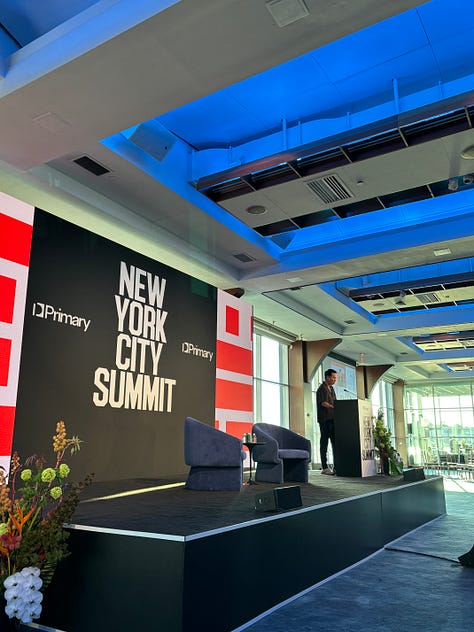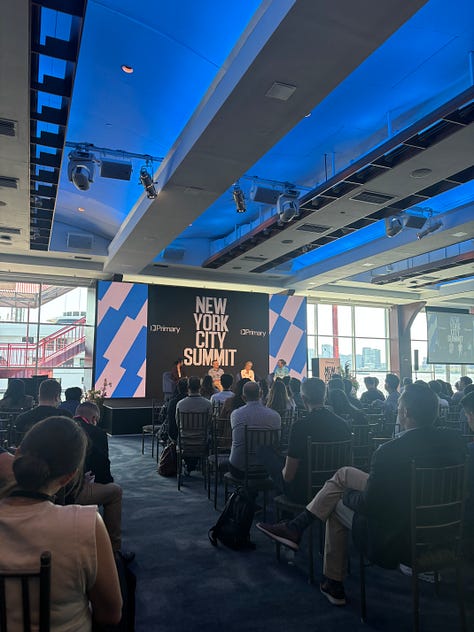Reflections from the NYC Summit on Venture Capital and Startups
I had the pleasure of attending the NYC Summit hosted by Primary Venture Partners as a Fellow in their new program Factor. Factor connects top NYC talent from underrepresented groups to careers in venture-backed startups, and we were lucky to be able to attend the Summit this year at Pier Sixty in Chelsea. The energy in the room was palpable from the moment I walked in. Founders, investors, and innovators gathered excitedly to connect and collaborate. It was incredible to witness so many conversations sparking to life, with ideas bouncing between some of the brightest minds in venture capital and the startup ecosystem in New York. Personally, I sought out conversations about healthcare tech and investments, seeking to grow my knowledge base as a medical student and consultant. And this environment—full of doers, thinkers, and innovators—was an exhilarating break from the hospital floors.



Here in this article, I have condensed my reflections from the NYC Summit experience and key takeaways from conversations with healthcare startup founders and investors.
Key Insights on Startups and Venture Capital
One of the most significant takeaways for me was learning how early-stage and late-stage investors evaluate startups. Early-stage investors often focus less on the product itself and more on the founder and the market. These investors are essentially betting on the individual founder—their traits, expertise, and ability to adapt—rather than the current product, which may evolve as the company pivots to solve emerging problems. In contrast, late-stage investors are far more focused on unit economics, product viability, and scalability, ensuring the product has a proven track record before committing.
The relationship between equity and cash flow also stood out in many conversations. Early-stage founders often face the tough decision of giving up equity in exchange for capital. The runway pressures founders to balance their needs for cash while maintaining long-term equity control. The right decisions at this stage can set the tone for a startup's trajectory.
Networking: The Power of Building Connections
One of the more important reminders I took from the summit was the critical importance of networking. Whether you’re starting a company or planning to invest, your network is everything. This is how jobs open, how you find operators for your company, how you hear about deals or how you can get expert advice for free. Asking founders, “What are you building?” or asking investors, “What are you investing in?” opens up these meaningful conversations. But you have to take it one step further, connect on LinkedIn or exchange contact info before the encounter ends. Building your personal CRM is vital so you can go back and reference this village you’re building. Connecting with industry-specific individuals at networking events helps you learn the language of that niche, ultimately leading to stronger relationships and collaborations. Conversations at the healthcare networking event got much deeper compared to the broader scope of the pre-seed networking events. Establishing yourself as a thought leader in one niche allows you to become a unique sub specialist, with opinions that will be highly sought after once you can leverage your network correctly. I recently heard a phrase that went like “if you build your network strong enough, you’ll never have to cold apply for a job again.”
Healthcare Startups: The Challenge of Building in Healthcare
Healthcare startups face their own set of unique challenges, particularly when it comes to engaging with payers and proving the viability of their solutions. Building healthcare service companies is often slow and labor-intensive, requiring long sales cycles that can take 12 months or more. Startups in care delivery need strong clinical models that show measurable reductions in total cost of care and improved outcomes. Unfortunately, many pre-seed to seed healthcare startups struggle with product-market fit, especially if they lack a clinically minded co-founder or operator. Understanding the patient journey and focusing on product-market fit from a clinical perspective is crucial to get right in the pre-seed stage for digital health or care delivery startups. While early stage investors usually are looking to focus more on founders than product, in health tech this might not be playing out exactly as it does for other industries. Pre-seed heathtech companies need to have more mature products at the early stage because of recent economic headwinds.
At the summit, I also realized that FinTech models can be applied to healthcare, but they could result in point solutions that further complicate interoperability between systems. The solutions that improve interoperability are highly sought after. In value-based care (VBC), startups face the hurdle of getting in front of payers, a process that requires being at the right place, at the right time, with the right solution. Generalized investors might not know the nuances of how to evaluate startups with VBC models, and these startups may not be able to maintain runway long enough to show investors positive returns, reductions in cost of care, and improvement in outcomes. This is a delicate balance for founders to develop their growth strategy, try to maintain runway, and approach investors at the right maturity level.
The Contrarian Approach and Risk-Taking
One message that resonated with me deeply was the importance of being willing to take risks. The best founders aren’t afraid to go against the grain. Often, startups begin by solving a personal problem, which fuels their passion and drive. The founders who are willing to take the leap—especially in industries that need transformation—are the ones who make lasting impacts. Contrarian investors seek these founders who are not just improving existing systems but fundamentally changing how we think about healthcare, tech, and beyond.
However, not every startup needs to disrupt an entire industry. At the summit, we explored how improving what's already working—making it better, faster, and smarter—can be enough to build a successful company. This balance of innovation versus optimization is often key in healthcare, where risk-aversion can sometimes hold back necessary changes.
Final Thoughts
Attending the NYC Summit hosted by Primary Venture Partners was an excellent experience; it helped me better understand the nuances of the startup and venture capital world, even specifically within the healthcare sector. The insights I gained about early-stage versus late-stage investing, the importance of product-market fit in healthcare, and the critical role of networking have expanded my perspective. For those interested in healthcare, health tech, or investing, I highly recommend attending as many events as possible, to not only gain valuable insights, but also build relationships that will shape your career, voice, and mind.



